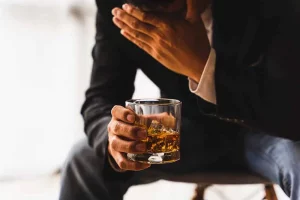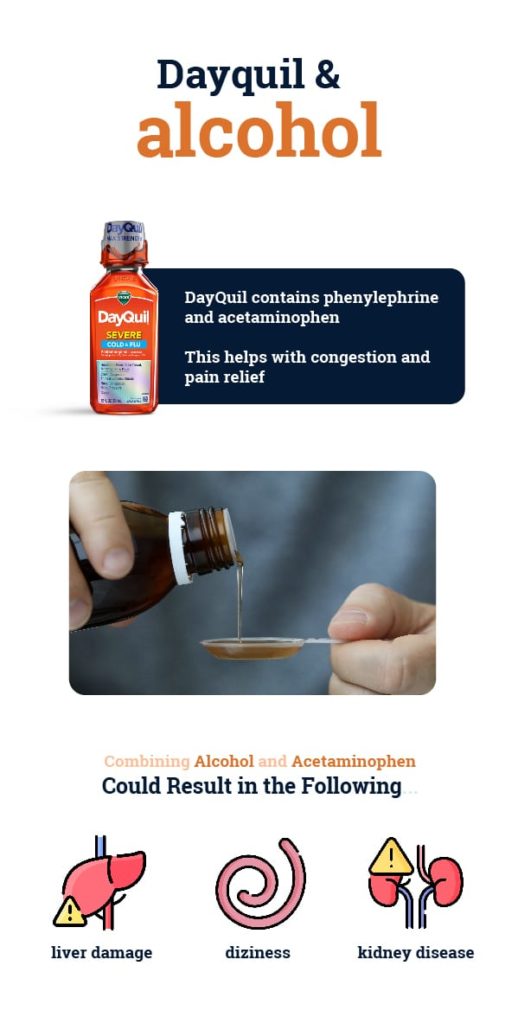 People have gotten so used to taking over-the counter medications for most conditions that they barely give a thought to what they take with it. While some take the usual precautions and only use water, others prove to be somewhat reckless and take their medications with alcohol.
People have gotten so used to taking over-the counter medications for most conditions that they barely give a thought to what they take with it. While some take the usual precautions and only use water, others prove to be somewhat reckless and take their medications with alcohol.
This practice is needlessly hazardous, considering that there are so many ways a combination of substances could damage a body. This is particularly true in the case of those who take DayQuil and alcohol.
Jump to Section
Is It Dangerous To Take DayQuil With Alcohol?
Vicks DayQuil is a popular over-the-counter medication intended to help relieve the discomfort that comes with a flu or a cold, including mild aches and pains, sore throat, sneezing, fever, headache, and cough.
DayQuil contains phenylephrine, which is a decongestant, dextromethorphan, a cough suppressant, and acetaminophen, which is a pain reliever and antipyretic. Each of these components could have a different, and quite possibly complicated reaction to alcohol, depending on who takes it.
This is why it is always a good idea to consult first with a physician as to what possible effects a particular medication could have when taken with other substances such as alcohol. If possible, the safer way would be to refrain from taking potentially reactive substances such as alcohol and other medications, along with DayQuil.
How Long After Taking DayQuil Can You Drink Alcohol?
A person should wait 4-6 hours after taking DayQuil to drink alcohol safely. Consult a healthcare professional or the medication label for personalized instructions, as interactions vary based on individual factors.
Refrain from taking in two substances that could have adverse effects on the body if combined. Depending on the physiology of a person, a single drink of alcohol could stay in the body for a minimum of three hours. Anything taken within this period could react with the alcohol already in the body.
Conversely, DayQuil’s effects could last anywhere between four to six hours, depending on the person. Any other substance taken during this period could also interact with the DayQuil already in the system. Due to the fact that different people have different thresholds, whatever period passes for a “safe” time to take alcohol after taking DayQuil, or vice versa, is completely relative to the person.
Can Cold Medication Be Taken With Alcohol?
Depending on the type of medication being taken, people often say they experience drowsiness, dizziness, and to a certain extent, some measure of motor impairment, or difficulty in moving normally. These effects could be significantly amplified when the cold medication is taken with alcohol.
Cold medications containing dextromethorphan, which is present in DayQuil, could cause heavy sedation and respiratory depression when it mixes with alcohol in the body. This could knock a person out completely and also slow a person’s breathing to dangerous levels, potentially even being lethal at some point.
What Are the Risks Associated When Taking DayQuil With Alcohol?


The type of reaction and severity could depend upon the person and the particular components of the medication taken with alcohol. In the case of mixing DayQuil with alcohol, the more prominent findings include:
Studies have shown that combining alcohol and acetaminophen could potentially cause liver damage. While not common, the damage could be anywhere from being severe to actually life-threatening.
Mixing alcohol with phenylephrine could lead to varying degrees of confusion, dizziness, lightheadedness, difficulty in breathing, and loss of balance. There are even cases wherein people who were rendered unconscious by the combination of these two substances remained unresponsive to efforts to wake them up.
Recent studies into possible effects of combining acetaminophen and alcohol show more than double the risk of developing kidney disease, as well as liver damage.
All of these components are in the formulation of DayQuil, and with such risks, it is simply too dangerous to risk mixing the two substances, regardless of how tolerant a person might be to substance interaction in the body.
Mixing DayQuil and Alcohol FAQs
Can I Mix DayQuil and Alcohol?
It is not recommended to mix alcohol and DayQuil. Medication that contains acetaminophen is broken down by the liver, which is also where alcohol is processed. By combining DayQuil and alcohol, you are increasing the likelihood of causing liver damage.
What Happens if I Mix DayQuil and Alcohol
Potential effects of mixing DayQuil and alcohol include:
- Dizziness
- Rapid Heartbeat
- Drowsiness
- Stomach Pain
- Risk of internal bleeding
How Long After Taking DayQuil Can I Drink?
It is generally recommended not to mix alcohol and DayQuil. But 4-6 hours after taking a dose of DayQuil, it is no longer in the body, diminishing most health risks associated with mixing the two substances.
Could Drinking DayQuil and Alcohol Be a Sign of a Bigger Issue?


- Neurological issues that lead to sudden and unpredictable mood and personality changes
- Diminished physical coordination
- Cardiomyopathy
- Arrhythmia
- Hypertension
- Stroke
- Alcoholic hepatitis
- Liver fibrosis
- Cirrhosis
- Pancreatitis
- Cancer
Chances of developing one or more of these issues are significantly increased when overconsumption of alcohol is paired with substance use. In the case of DayQuil, as it typically induces feelings of sleepiness and deep relaxation due to its narcotic effect, some people might find that pairing it with alcohol produces an even greater experience.
How Severe Are the Withdrawal Symptoms of DayQuil Abuse?
Dextromethorphan, a component of DayQuil, is a unique substance in that it can induce opposing effects when taken in different dosages. When taken in lower doses, it acts as a stimulant, and on higher doses, it creates a sedative effect.
In even higher doses, it acts as a dissociative hallucinogen, creating feelings of detachment from surroundings and from the self. This particular effect is one of the reasons why medication containing dextromethorphan is used as a recreational drug.
Recreational drugs are notoriously known for inducing full blown drug addiction, and DayQuil is no exception. During detox in our Illinois center, withdrawal symptoms that manifest from DayQuil abuse include:
- Restlessness
- Cold flashes
- diarrhea, stomach pains, and vomiting
- Insomnia
- Muscle pain
How Is DayQuil and Alcohol Addiction Treated?
Substance abuse always induces significant change in a person. This typically manifests as a change in how they think, feel, and behave. In many instances, the changes could be so severe that they hardly bear any resemblance to their normal selves before giving in to substance abuse.
As such, a good amount of attention is put into psychological and physical dayquill and alcohol addiction treatment to address these changes.
Cognitive Behavioral Therapy
The mere fact that the patient had no inclination to stop their substance dependency on their own means there is a need to address how they perceive right and wrong, and how they deal with each choice accordingly.
In many instances, their reaction to stress and problems is substance use, and this is a response that needs to be corrected. By CBT they develop better coping strategies to stress and problems, substance use is taken away as a valid response and replaced with other responses that will not endanger them.
Dialectical Behavior Therapy
Substance abuse is classified as a form of self-harm, which in turn is triggered by certain factors. Even if some people have the natural tendency to protect themselves from harm, including that which they do to themselves, they could be prone to an overload of emotions which negates any capability of self preservation.
Being overwhelmed with negative emotions, many often turn to substances that help deaden their ability to think and feel, such as alcohol and drugs. Dialectical behavior therapy seeks to shore up a person’s ability to withstand being emotionally overwhelmed and allow them to assess their situation better, and formulate a response to it that does not involve self-harm.
Find Help With Northern Illinois Recovery




Licensed Physician and Surgeon
Dr. Beth Dunlap, a board-certified addiction medicine and family medicine physician, and is the medical director at Northern Illinois Recovery Center. She is responsible for overseeing all the integrated medical services at both campuses. Beth completed medical school, residency, and fellowship at Northwestern University, where she continues to serve on the faculty as a member of the Department of Family and Community Medicine. She has extensive experience in addiction medicine at all levels of care, and her clinical interests include integrated primary care and addiction medicine, harm reduction, and medication-assisted treatment.



